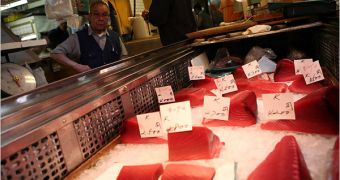Sushi is an integral part of the Japanese culture. And tuna is the king of the sushi. But the current world shortages of tuna could remove it from Japan's sushi menus, something unimaginable in a country where tuna has as many names as snow for the Eskimals.
When global fishing bodies recently started lowering the catch limits for the world's rapidly depleting tuna fisheries, Japan entered a national state of panic. News programs reported the galloping prices were driving top-quality tuna off supermarket shelves. That's why sushi chefs have started replacing it with substitutes, from cheaper fish varieties to terrestrial variants and even American sushi variations like avocado rolls.
"It's like America running out of steak. Sushi without tuna just would not be sushi." said Tadashi Yamagata, vice chairman of Japan's national union of sushi chefs.
The issue is aggravated by the growing appetite for sushi and sashimi outside Japan, from US to countries with new wealth, like Russia, South Korea and China. This increases the pressure on the population of bluefin tuna, the large, slow-maturing species, most favored in sushi.
In 2006, the yearly tuna catches in the eastern Atlantic and Mediterranean were decreased by 20 %, in order to allow the recovery of the populations. But this just boomed prices of the three species of bluefin (northern, Pacific and southern), with over a third, to $13 a pound. Competition from foreign fishing fleets and buyers has decreased the number of top-quality tuna reaching the Japanese market.
"Three years ago, I routinely sold two or three top-grade bluefin every day. This year, I sometimes finds only two or three tuna of that quality to sell in a month." said Tadashi Oono, a tuna seller in a fish market of Tokyo.
The anxiety over tuna shortages in Japan could be due to its recent economic decline, especially when compared with neighboring China. Following the World War II, tuna turned into a symbol of the economic might, allowing Japan to dominate the buying of tuna worldwide, from Boston to Cape Town.
Annually, Japanese eat about 60,000 tons of the three bluefin species, 75 % of the world's catch. But the status of tuna superpower for Japan seems to be fading.
"Fish that would have gone to Tokyo are now ending up in New York or Shanghai. This has been devastating to Japan's national esteem," said Sasha Issenberg, the author of "The Sushi Economy" (Gotham, 2007).
Because high-quality tuna at reasonable prices is harder to find, restaurants turn to alternatives.
"The current situation reminded me of the last time I had no tuna to sell - in 1973, during a scare over mercury poisoning in oceans when customers refused to buy it." said Shigekazu Ozoe, 56, who owns a midpriced restaurant in a residential neighborhood in Tokyo.
At that time, he tried with other red-colored substitutes like smoked deer meat and raw horse, which are local delicacy in many parts of the Japan.
"We tasted it, and horse sushi was pretty good. It was soft, easy to bite off, had no smell. If worse comes to worst, I could always try horse and deer again. The only drawback was customers objecting to red meat in the glass display case on the counter of his sushi bar. One customer pointed and said: 'You have something four-legged in your fish case? That's eerie!'" he recalled.
"The prices of top-name tuna like Ouma are already as high as they can go. What will happen is that the prices of lower grades of tuna will rise to catch up." said Yosuke Imada, owner of another Tokyo restaurant.
Yamagata, 59, the owner of a restaurant catering to the business lunch crowd that has been in his family for four generations, recognized that his best substitutes were "imported" from US, like smoked duck with mayonnaise and crushed daikon with sea urchin and for this he annually travels to sushi restaurants in New York and Washington for "stealing" new ideas. "We can learn from American sushi chefs. Sushi has to evolve to keep up with the times." said Yamagata.

 14 DAY TRIAL //
14 DAY TRIAL //